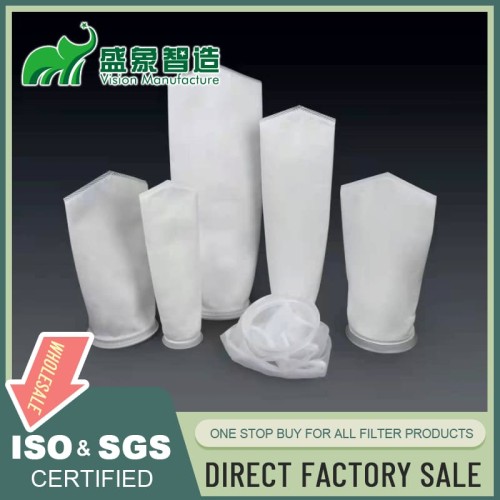
Bag Filters for Wastewater Treatment: Essential Solutions for Clean Water
I. Introduction
Wastewater treatment is crucial for maintaining environmental health and ensuring water sustainability. Bag filters play a vital role in this process by efficiently removing contaminants from wastewater. This article discusses the importance of bag filters in wastewater treatment, highlighting their benefits and diverse applications.
Wastewater treatment is crucial for maintaining environmental health and ensuring water sustainability. Bag filters play a vital role in this process by efficiently removing contaminants from wastewater. This article discusses the importance of bag filters in wastewater treatment, highlighting their benefits and diverse applications.
II. Types of Bag Filters for Wastewater Treatment
- Standard Felt Bags: Commonly used for general filtration, capable of removing a wide range of particulates.
- Melt-blown Polypropylene Bags: Excellent for finer filtration, effectively removing smaller particulates due to their dense structure.
- Nylon Monofilament Mesh Bags: Ideal for applications requiring high strength and good chemical resistance.
- Multi-layer Composite Bags: Combine several materials to enhance filtration efficiency and dirt-holding capacity.
III. Key Design Features
- Micron Ratings and Filtration Efficiency: Bag filters are available in various micron ratings to target specific particle sizes.
- Material Selection for Chemical Compatibility: Ensures that the bags can withstand the chemicals present in wastewater without degrading.
- Size and Capacity Options: Available in different sizes to accommodate the flow rates and volumes of wastewater treatment systems.
- Attachment and Sealing Mechanisms: Designed to ensure a secure fit and prevent bypass, enhancing filtration effectiveness.
IV. Applications in Wastewater Treatment
- Pre-filtration for Membrane Systems: Protects and extends the life of downstream membrane systems by removing larger particulates.
- Suspended Solids Removal: Effectively captures suspended particles, improving the clarity and quality of the treated water.
- Oil and Grease Separation: Specialized bag filters are used to reduce oil and grease, a common requirement in industrial wastewater treatment.
- Heavy Metal Reduction: Certain filter materials can reduce heavy metals, contributing to safer discharge levels.
- Biological Contaminant Removal: Some bags are treated or designed to capture biological contaminants, enhancing pathogen removal.
V. Performance Characteristics
- Flow Rate Capabilities: Bag filters are designed to handle high flow rates, making them suitable for large-scale wastewater treatment.
- Dirt-Holding Capacity: High capacity to hold captured solids, reducing the frequency of change-outs.
- Pressure Drop Considerations: Engineered to minimize pressure drops, maintaining efficient system operation.
- Chemical and Temperature Resistance: Materials are selected to resist the harsh conditions often found in wastewater treatment environments.
VI. Installation and Operation
- Proper Bag Filter Housing Design: Crucial for maximizing filtration efficiency and ease of maintenance.
- Installation Best Practices: Ensures optimal performance and longevity of the filter bags.
- Monitoring and Maintenance Procedures: Regular monitoring and maintenance extend the operational life and prevent system failures.
- Replacement Frequency and Indicators: Scheduled replacements based on pressure drop, flow rate decrease, or visual inspection.
VII. Advantages of Bag Filters in Wastewater Treatment
- Cost-effectiveness: Offers a low-cost solution compared to other filtration technologies.
- Flexibility and Adaptability: Easily adjusted to changing water quality and treatment needs.
- Easy Maintenance and Replacement: Simple design allows for quick and easy changes, reducing downtime.
- Compatibility with Various Treatment Processes: Can be integrated into most existing wastewater treatment infrastructures.
VIII. Environmental Impact
- Contribution to Water Conservation Efforts: Enables the reuse of treated wastewater, reducing the demand on freshwater resources.
- Reduction of Pollutants in Effluent: Significantly lowers the levels of physical, chemical, and biological contaminants.
- Energy Efficiency Compared to Other Methods: Generally requires less energy, contributing to lower operational costs.
- Proper Disposal and Recycling of Used Bags: Encourages responsible disposal practices to minimize environmental impact.
IX. Regulatory Compliance
- Meeting Effluent Quality Standards: Helps facilities meet stringent discharge regulations.
- Industry-specific Wastewater Regulations: Adaptable to meet the specific requirements of various industries.
- Environmental Protection Agency Guidelines: Ensures compliance with national and international environmental standards.
X. Case Studies and Success Stories
- Municipal Wastewater Treatment Improvements: Demonstrates significant enhancements in water quality and compliance with regulatory standards.
- Industrial Process Water Recycling: Shows how bag filters facilitate the reuse of water in industrial settings, reducing waste and operational costs.
- Challenging Contaminant Removal Scenarios: Highlights the effectiveness of bag filters in removing difficult contaminants from wastewater.
XI. Innovations and Future Trends
- Advanced Materials for Enhanced Filtration: Development of new materials that offer superior filtration performance.
- Smart Monitoring and Self-Cleaning Systems: Incorporation of technology to automate monitoring and increase operational efficiency.
- Integration with Other Treatment Technologies: Combines with advanced treatment processes to improve overall system performance.
- Sustainable and Biodegradable Filter Options: Focuses on environmentally friendly materials that reduce the ecological footprint.
XII. Cost-Benefit Analysis
- Initial Investment Considerations: Evaluates the upfront costs associated with implementing bag filter systems.
- Operational Cost Comparisons: Analyzes ongoing expenses such as energy consumption and maintenance.
- Long-term Savings and ROI: Assesses the long-term financial benefits from improved efficiency and reduced waste.
XIII. Conclusion
Bag filters are indispensable tools in wastewater treatment, offering efficient solutions that improve water quality and ensure compliance with environmental regulations. As technology evolves, these filters are expected to become even more effective and sustainable, playing a crucial role in global water management strategies.
Bag filters are indispensable tools in wastewater treatment, offering efficient solutions that improve water quality and ensure compliance with environmental regulations. As technology evolves, these filters are expected to become even more effective and sustainable, playing a crucial role in global water management strategies.
Leave a comment

